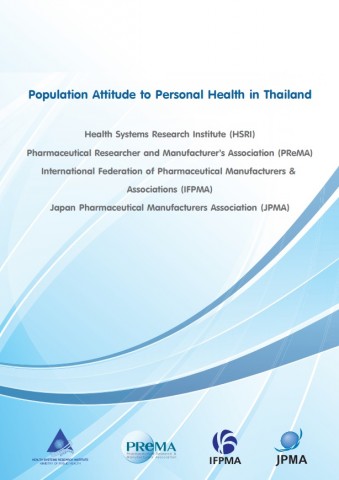Thais want a happy family life and to be healthy, but find it challenging to change behavior.

1 October 2014, Bangkok – The Health Systems Research Institute (HSRI), The Pharmaceutical Research and Manufacturers Association (PReMA), The International Federation of Pharmaceutical Manufacturers and Associations (IFPMA) and Japan Pharmaceutical Manufacturers Association (JPMA) released a joint report investigating the gaps between the Thai people’s knowledge in the prevention of non-communicable diseases (NCDs) and their behavior in implementation preventative practices.
The report entitled “Population Attitude to Personal Health in Thailand” assesses Thais’ attitudes towards behavioral risk factors of NCDs and builds on a similar study conducted in Russia in 2011. The research is intended to assist policy makers and healthcare professionals in the development of NCD prevention programs.
The leading cause of death and illness worldwide, NCDs include diabetes, cancer, heart, and chronic respiratory diseases. In Thailand NCDs are responsible for nine of the ten leading causes of death and disability. At a global level, half of the deaths attributable to NCDs are preventable through adopting education programs and implementing measures that promote healthy behaviors.
The report shows that while Thais are well informed of the health risks due to certain behaviors, new targeted approaches that encourage health activities would be positively adopted by the population. The report is the result of a quantitative study which featured interviews to a random sample of 420 Thais aged between 18 and 60.
“Data in the report show that health education programs on NCDs have been successful in promoting awareness among Thais, and should therefore continue. However, awareness is just the first step, and the report suggests that transforming awareness into behavioral change is challenging and more can be done. Without such change, the NCD burden will continue to be an increasingly significant drain on Thailand’s health system resources and economy”, said Professor Somkiat Wattanasirichaigoon, Director, Health Systems Research Institute.
The gap between level of knowledge of adequate prevention practices and actual healthy behaviors could be due to the fact that most Thais are ambivalent about reducing risky health behaviors and will delay taking action until it becomes an immediate concern. For example, the study indicates that despite a high knowledge of the negative health impacts of smoking and alcohol consumption, there has not been success in reducing consumption in the existing users. Similarly, there is high awareness of the health benefits of being physically active, but the data suggests that it has been difficult to incorporate physical activity into the daily routine.
The study makes several recommendations for interventions that would address the issue of how to reinforce positive behavior after health knowledge is acquired. These include the adoption and implementation of policies that facilitate and encourage more physical activities, such as fostering the creation of more convenient public exercise spaces.
“Prevention, also through physical activity, is the best value for money in curbing NCDs. Government actions in support of personal healthy lifestyle programs can make a dent in the tragic and escalating trend of deaths and disability through NCDs”, said Mario Ottiglio, Director of Public Affairs and Global Health Policy, IFPMA.
Although the reports confirms that the level of knowledge of healthy behavior is high in Thailand, the research also indicates a lower level of knowledge of one’s personal vital health information such as blood sugar and blood pressure readings, and that over 50% of those surveyed have not visited a doctor in the past year other than for necessity. Based on the findings, policies that promote greater self-responsibility of one’s behavior and self-monitoring of health are recommended interventions. The study stresses public-private collaborations are key to help promote NCD prevention and can inspire additional work between public and private sectors to continue.
“The impact of NCDs on Thailand’s population should be a shared concern. PReMA seeks to collaborate with other public institutions to help reverse the trend. By working together, we can be more effective and witness greater success in fighting NCDs. This report is one example of such collaboration, and also shows that the people are also needed to effect change.” said Busakorn Lerswatanasivalee, CEO, Pharmaceutical Research and Manufacturers Association.
Health Systems Research Institute (HSRI)
HSRI was established by the Health Systems Research Institute Act of 1992. HSRI’s organizational and management architecture was designed to allow the institute more flexibility to function in the ever-evolving economic, social and political environment. Working in partnership with multilevel public and private agencies, HSRI’s main goal is to achieve effective knowledge management in the service of the Health System.
www.hsri.or.th
Pharmaceutical Research & Manufacturers Association (PReMA)
PReMA is a non-profit organization representing members who are research based pharmaceutical companies innovating medicines to combat the previously incurable and to improve existing treatments. PreMA is committed to promoting good health and quality of life for Thai people and to supporting the advancement of public health systems through the research and development of innovative medicines. PReMA also supports the rights of people and healthcare professionals to choose high quality medicines that best meet their needs.
www.prema.or.th
Japan Pharmaceutical Manufacturers Association (JPMA)
JPMA is a voluntary association comprising 72 research-oriented pharmaceutical companies. JPMA has been contributing to advancing global healthcare through the development of innovative ethical drugs, facilitating sound development of the pharmaceutical industry through proactively establishing policies and recommendations in response to globalization and enhancing public understanding of pharmaceuticals.
www.jpma.or.jp
International Federation of Pharmaceutical Manufacturers & Associations (IFPMA)
IFPMA represents the research-based pharmaceutical companies and associations across the globe. The research-based pharmaceutical industry’s 1.3 million employees research, develop and provide medicines and vaccines that improve the life of patients worldwide. Based in Geneva, IFPMA has official relations with the United Nations and contributes industry expertise to help the global health community find solutions that improve global health.
www.ifpma.org
For more information please contact:
Mario Ottiglio, Director, Public Affairs & Global Health Policy
Tel: +41 22 338 32 11 – E-mail : m.ottiglio(at)ifpma.org







